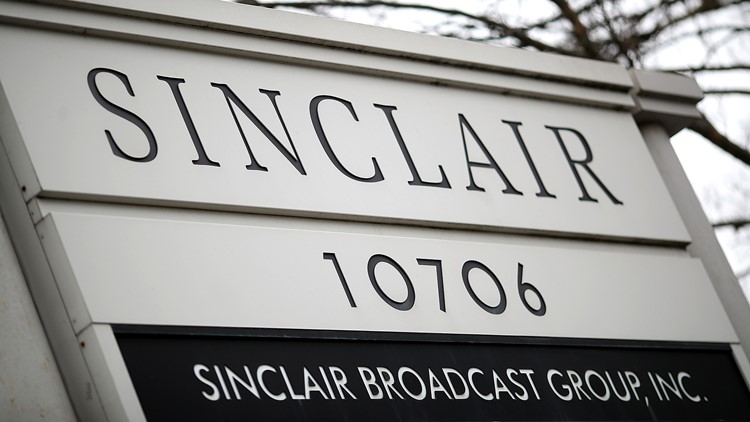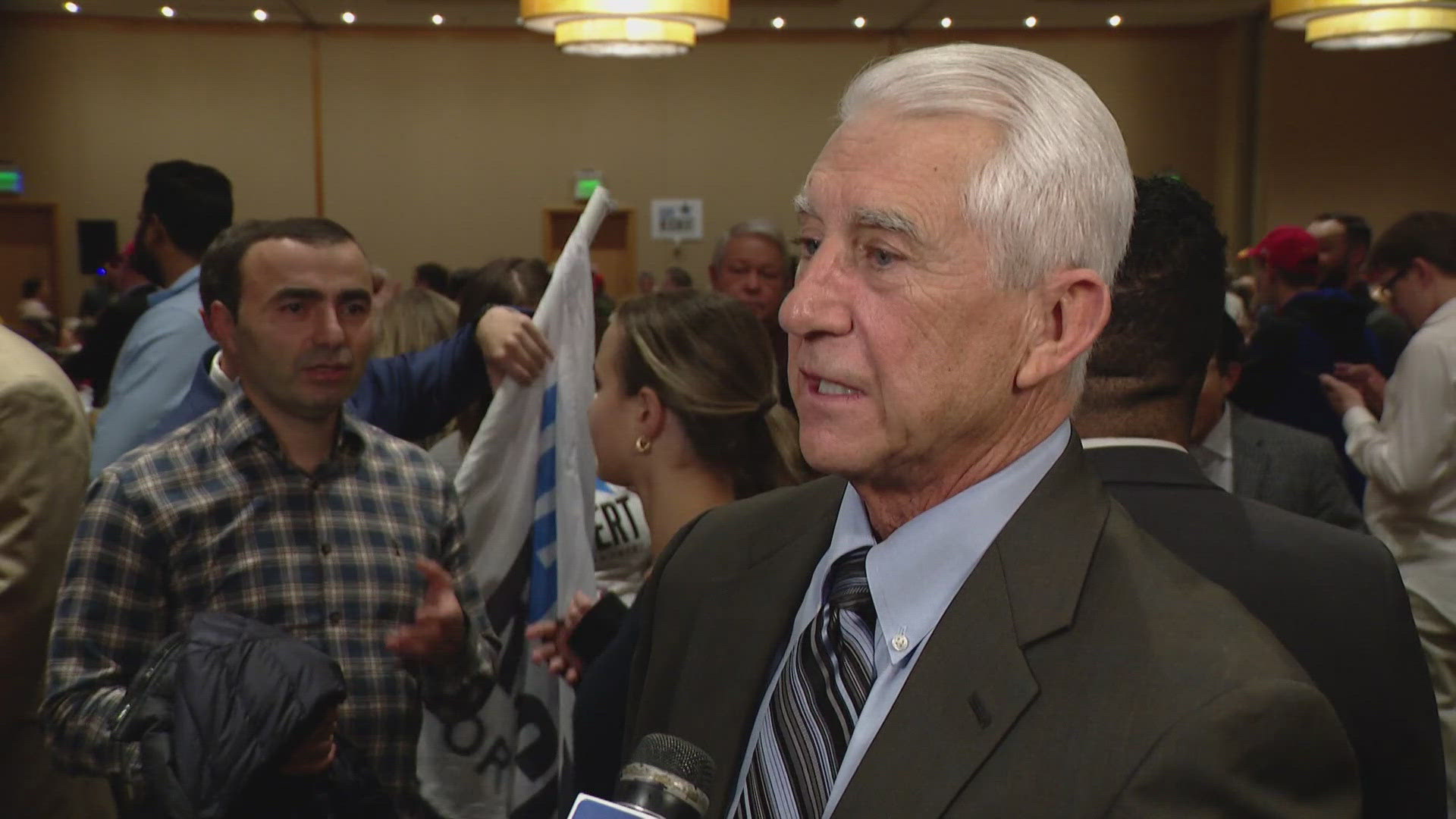Senators Patty Murray and Maria Cantwell, D-Wash., are among 12 U.S. Senators calling for the FCC to investigate Sinclair Broadcast Group for what they call "deliberately distorting news." They also want the FCC to hold off on a proposed merger between Sinclair and Tribune Media.
The senators say they are concerned about local news anchors at Sinclair stations being told to read company-mandated scripts.
"We are concerned that Sinclair is engaged in a systematic news distortion operation that seeks to undermine freedom of the press and the robust localism and diversity of viewpoint that is the foundation of our national broadcasting laws," the senators wrote.
Sinclair has come under fire the last two weeks after Deadspin released a video that showed dozens of local Sinclair station anchors reading from an identical script about "fake news."
Sinclair owns nearly 200 local stations -- which would increase to 233 if the merger is approved -- and had ordered its anchors to read a statement expressing concern about "the troubling trend of irresponsible, one-sided news stories plaguing the country." Some outlets publish these "fake stories" without checking facts first and some people in the media push their own biases, the statement said.
The anchors give no specific examples. Sinclair, whose corporate leadership leans right, uses terminology familiar to President Donald Trump and his criticisms of "fake news." In the message, the anchors say they "work very hard to seek the truth and strive to be fair, balanced and factual."
Trump has publicly defended Sinclair on Twitter, saying "Sinclair is far superior to CNN and even more Fake NBC."
One of Sinclair's political commentators, Boris Epshteyn, is a former adviser in the Trump White House.
“Because of the new facts that have come to light with regard to Sinclair’s misconduct and abuse of the public trust pertaining to its existing broadcast licenses, we believe it is appropriate to pause the pending Sinclair-Tribune merger review and reopen the agency record on the transaction so that the FCC can receive another full round of robust public comments," the senators wrote.
Sinclair owns Seattle's KOMO. If the merger with Tribune is approved, it would also own Seattle's KCPQ.
Here is the full letter:
Dear Chairman Pai:
We write to express our grave concerns regarding Sinclair Broadcasting Group's (Sinclair) conduct. This conduct affects its fitness to hold its existing broadcast licenses and its fitness to acquire even more broadcast licenses through the proposed merger with Tribune Media Company (Tribune).
In particular, we have strong concerns that Sinclair has violated the public interest obligation inherent in holding broadcast licenses. Sinclair may have violated the FCC's longstanding policy against broadcast licensees deliberately distorting news by staging, slanting, or falsifying information (traditionally known as the news distortion standard). Multiple news outlets report that Sinclair has been forcing local news anchors to read Sinclair-mandated scripts warning of the dangers of "one-sided news stories plaguing our country," over the protests from local news teams.
As strong defenders of the First Amendment, guarantees of free speech and freedom of the press, we are alarmed by such practices. In the United States, the airwaves belong to the American people. The Federal Communications Commission (FCC) is responsible for ensuring that broadcast licensees use the public airwaves to serve the public interest. We call on the FCC to investigate whether Sinclair's production of distorted news reports fails the public interest test.
These Sinclair actions also undermine the legitimacy of non-Sinclair news outlets. In fact, following the recent wave of stories about scripted broadcasts, a Sinclair commentator asserting the neutrality of Sinclair's news content said (in another must-run segment), " he same [Notes:objectivity] cannot be said for cable and broadcast news hosts who inject their opinions and bias into news coverage all the time without drawing any lines between them."
Furthermore, must-run dictates from Sinclair harm the freedom of the press guaranteed in the First Amendment by turning local journalists into mouthpieces for a corporate and political agenda. In the context of our strong commitment to the First Amendment, guarantees of free speech, and freedom of the press, we are troubled by such practices. These Sinclair must-run segments must be reviewed in the context of recent steps taken at the FCC to further enable Sinclair to expand the scope and scale of its news distortion operations. Specifically, in the last past 18 months:
• The FCC has implemented a series of media ownership rule changes that directly benefit Sinclair;
• The FCC inspector general commenced an investigation of whether a disturbing pattern of meetings and communications between Sinclair, the Trump Administration, and you, suggests a quid pro quo that violates the public interest mission of the FCC;
• President Trump has publically praised Sinclair while attacking every other media outlet that publishes stories he views as critical; and
• Sinclair has proposed merging with Tribune and that transaction is currently pending at the FCC.
Because of these concerns, we are requesting that the FCC review both Sinclair's fitness to retain its existing broadcast licenses and whether it is in the public interest to permit it to acquire more broadcast licenses thorough the proposed merger with Tribune.
As you know, the FCC is required to base its broadcast licensing decisions on "the determination of whether those actions will serve the public interest, convenience, and necessity."
Moreover, the FCC recognizes that:
As public trustees, broadcast licensees may not intentionally distort the news: the FCC has stated that "rigging or slanting the news is a most heinous act against the public interest." The Commission will investigate a station for news distortion if it receives documented evidence of such rigging or slanting, such as testimony or other documentation, from individuals with direct personal knowledge that a licensee or its management engaged in the intentional falsification of the news. Of particular concern would be evidence of the direction to employees from station management to falsify the news.
We are concerned that Sinclair is engaged in a systematic news distortion operation that seeks to undermine freedom of the press and the robust localism and diversity of viewpoint that is the foundation of our national broadcasting laws.
Because of the new facts that have come to light with regard to Sinclair's misconduct and abuse of the public trust pertaining to its existing broadcast licenses, we believe it is appropriate to pause the pending Sinclair-Tribune merger review and reopen the agency record on the transaction so that the FCC can receive another full round of robust public comments.
We are concerned that if the Sinclair-Tribune merger continues without a thorough review of these new facts, Sinclair's practices of news distortion will proliferate to even more local stations, which Americans rely upon every day for fair and impartial news. Currently, Sinclair owns 193 stations in 89 markets. A Sinclair-Tribune merger, if approved, would create a broadcasting giant with 223 TV stations serving 108 markets (including 39 of the top 50), covering 72% of United States households. Given the recent and partisan changes to the media ownership rules, such as elimination of the main studio rule, Sinclair would have new tools to use in its quest to centralize its news operation and alter local broadcasting in ways that contravene the public interest.
For these reasons, it is imperative that the FCC investigate Sinclair's news activities to determine if it conforms to the public interest. This investigation should, at a minimum, examine whether the scripting of local news programs is tantamount to news distortion.
More generally, these new facts about how Sinclair operates its stations suggest that it may not be complying with the public interest obligations inherent in holding broadcast licenses. An affirmative finding could disqualify Sinclair from holding its existing licenses and should disqualify it from acquiring additional broadcast licenses.
Consistent with FCC precedent, extra weight should be given to evidence of the direction to employees, from Sinclair, to skew or falsify the news. FCC investigators should speak with current and former personnel at stations that have openly challenged Sinclair's directions to broadcast scripted segments or segments produced by Sinclair's national news operations.
We further request that the results of this investigation be made public and included in the record of the FCC consideration of the Sinclair-Tribune merger transaction.
The Associated Press contributed to this report.



